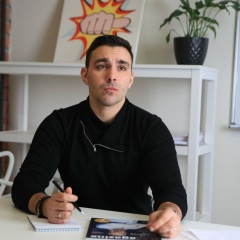О совести, о земле и о много о чем еще. О том, что с нами, где мы, куда мы.
Этот фильм - еще одна примета времени. К Михалкову можно относиться по-разному, но если маститый режиссер снимает документальный фильм об острейшей проблеме нашей страны...Это говорит о методично растущем напряжении и недовольстве в сердцах всех живущих на русской земле людей.
Фильм пронзителен, но не зубаст. Он скорее заставляет задуматься каждого из нас, куда мы все идем, даже не идем, а катимся, в какую пропасть, как материальную, так и духовную.
Это фильм, после которого правительство наше в лучшем случае хочется судить: за геноцид собственного народа, за преступное отношение к своей стране и своей земле.
Кстати, у того же Михалкова, в фильме "Раба любви" есть замечательная метафора: весь дом горит, а детей в детской забыли... Так и сегодня мы каждый запираемся в своей детской, зная, что нельзя от всего спрятаться под кровать, нельзя всю жизнь прятать глаза за розовыми шторками с медвежатами.
А если говорить о земле и о своей личной волне негодования и болезненной горечи, смешанной с обидой за всю ту же нашу землю - надеюсь, урожай все же хоть как-то удается собирать. Я достаточно поговорила с этими людьми, что бы испытать и этический бунт в сердце, и желание заниматься чем-то нужным и полезным, ну хотя бы не в оппозиции к собственной совести.
Я увлеклась. Посмотрите фильм. Он стоит того.
Этот фильм - еще одна примета времени. К Михалкову можно относиться по-разному, но если маститый режиссер снимает документальный фильм об острейшей проблеме нашей страны...Это говорит о методично растущем напряжении и недовольстве в сердцах всех живущих на русской земле людей.
Фильм пронзителен, но не зубаст. Он скорее заставляет задуматься каждого из нас, куда мы все идем, даже не идем, а катимся, в какую пропасть, как материальную, так и духовную.
Это фильм, после которого правительство наше в лучшем случае хочется судить: за геноцид собственного народа, за преступное отношение к своей стране и своей земле.
Кстати, у того же Михалкова, в фильме "Раба любви" есть замечательная метафора: весь дом горит, а детей в детской забыли... Так и сегодня мы каждый запираемся в своей детской, зная, что нельзя от всего спрятаться под кровать, нельзя всю жизнь прятать глаза за розовыми шторками с медвежатами.
А если говорить о земле и о своей личной волне негодования и болезненной горечи, смешанной с обидой за всю ту же нашу землю - надеюсь, урожай все же хоть как-то удается собирать. Я достаточно поговорила с этими людьми, что бы испытать и этический бунт в сердце, и желание заниматься чем-то нужным и полезным, ну хотя бы не в оппозиции к собственной совести.
Я увлеклась. Посмотрите фильм. Он стоит того.
About conscience, about the earth and about much else. That with us, where we are, where we are.
This film is another sign of the times. Mikhalkov can be treated differently, but if the venerable director makes a documentary about the most acute problem of our country ... This indicates a methodically growing tension and discontent in the hearts of all people living on Russian soil.
The film is piercing, but not toothy. Rather, it makes each of us think where we all go, we don’t even go, but roll into what abyss, both material and spiritual.
This is a film after which our government at best would like to judge: for the genocide of our own people, for the criminal attitude to our country and our land.
By the way, the same Mikhalkov, in the film “Slave of Love” has a wonderful metaphor: the whole house is on fire, and the children in the nursery are forgotten ... So today we each lock ourselves in our nursery, knowing that we can’t hide under the bed from everything, we can’t hide your whole life behind pink curtains with cubs.
And if we talk about the land and about our personal wave of indignation and painful bitterness, mixed with resentment for all our same land - I hope that the crop is still somehow managed to be harvested. I talked enough with these people to experience both ethical rebellion in my heart and a desire to do something necessary and useful, well, at least not in opposition to my own conscience.
I got carried away. Watch the movie. He's worth it.
This film is another sign of the times. Mikhalkov can be treated differently, but if the venerable director makes a documentary about the most acute problem of our country ... This indicates a methodically growing tension and discontent in the hearts of all people living on Russian soil.
The film is piercing, but not toothy. Rather, it makes each of us think where we all go, we don’t even go, but roll into what abyss, both material and spiritual.
This is a film after which our government at best would like to judge: for the genocide of our own people, for the criminal attitude to our country and our land.
By the way, the same Mikhalkov, in the film “Slave of Love” has a wonderful metaphor: the whole house is on fire, and the children in the nursery are forgotten ... So today we each lock ourselves in our nursery, knowing that we can’t hide under the bed from everything, we can’t hide your whole life behind pink curtains with cubs.
And if we talk about the land and about our personal wave of indignation and painful bitterness, mixed with resentment for all our same land - I hope that the crop is still somehow managed to be harvested. I talked enough with these people to experience both ethical rebellion in my heart and a desire to do something necessary and useful, well, at least not in opposition to my own conscience.
I got carried away. Watch the movie. He's worth it.
У записи 1 лайков,
0 репостов.
0 репостов.
Эту запись оставил(а) на своей стене Ирина Косторева





















